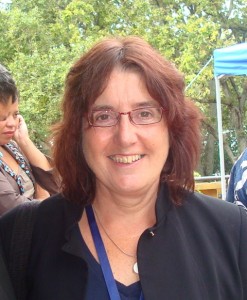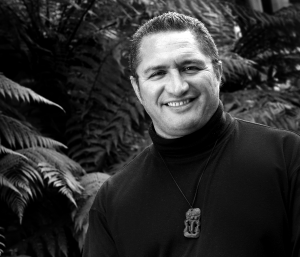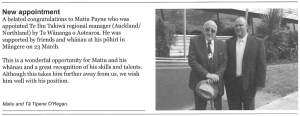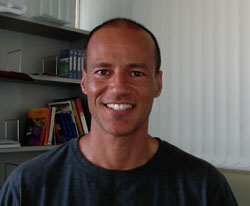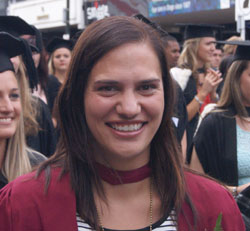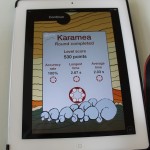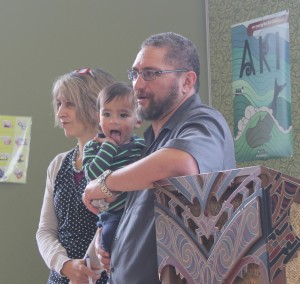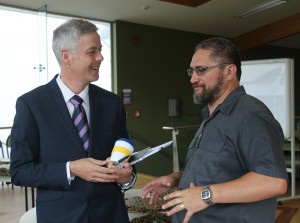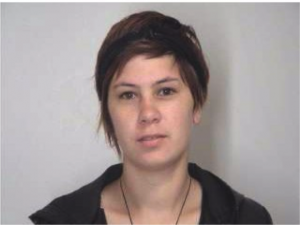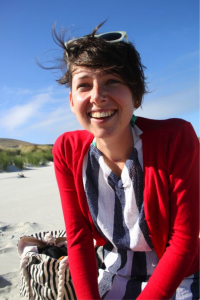Congratulations to Nathan Matthews
He mihi nunui ki a Nathan Matthews, e piki haere ana ki te ara mātauranga. Congratulations to Nathan Matthews in his new role at Te Whare Wānanga o Awananuiārangi. Nathan completed his undergraduate and postgraduate studies in Māori Studies in Te Tumu, completing his PhD in 2006. He also taught te reo Māori and Māori performing arts in Te Tumu for a number of years. In 2009 Nathan moved to Massey University to take up the role of Māori doctoral studies coordinator, later shifting to Whangārei as the founding principal of Te Kura Hourua O Whangarei Terenga Paraoa, a partnership secondary school. It’s great to hear that our former colleague and alumni of Te Tumu is heading back to the tertiary sector as Head of the School of Indigenous Graduate Studies at Te Whare Wānanga o Awanuiārangi.
Te Tumu scholar in successful Research Theme bid
Associate Professor Jenny Bryant-Tokalau of Te Tumu is one of 14 Principal Investigators in the recently awarded University Theme, Asia-Pacific Biocultural Health: Past and Present.
The theme, which is coordinated by Haille Buckley, Tuari Potiki, Tony Merriman and Sian Halcrow and has attracted academics from various Otago divisions, is funded for five years. It will investigate fundamental questions of the human past that have pressing implications for human society today in Aotearoa, the Pacific and Southeast Asia. Questions of the origins of people, non-communicable disease, and social inequality, and major subsistence and cultural change will be assessed drawing on a range of cross- and multi-disciplinary approaches mobilising research expertise in the University.
Jenny’s role in the theme is her work on adaptation to climate change and hardships and inequality in the Pacific.
“How whakapapa saved my life”
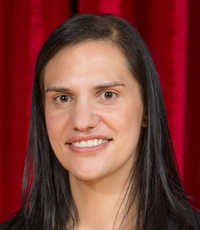 Dr Karyn Paringatai (Ngāti Porou) is perhaps best known for her innovative award-winning teaching pedagogy – teaching in the dark. But on 10 November, Karyn gave a talk for TEDxDunedin on a much more personal issue, on how learning her whakapapa saved her life. TEDx talks are about “Ideas Worth Spreading”.
Dr Karyn Paringatai (Ngāti Porou) is perhaps best known for her innovative award-winning teaching pedagogy – teaching in the dark. But on 10 November, Karyn gave a talk for TEDxDunedin on a much more personal issue, on how learning her whakapapa saved her life. TEDx talks are about “Ideas Worth Spreading”.
Click here to watch the video of Karyn’s talk.
Karyn teaches Māori language and performing arts in Te Tumu.
Success at the Ngā Kupu Ora Book Awards
I te Rāmere nei i tū ai Ngā Kupu Ora Book Awards, ā kei Te Hua o Te Reo Māori te wini mō te paraihe Reo. He mea ētita tēnei pukapuka e Ahorangi Rāwinia Higgins (he kaiako ia nō Te Tumu i ngā rā o mua) rātou ko Ahorangi Tuarua Poia Rewi (koia te Tīni o Te Tumu ināianei) ko Vincent Olsen-Reeder.
The Ngā Kupu Ora Book Awards were held on Friday. The Value of the Māori Language: Te Hua o Te Reo Māori, co-edited by former Te Tumu staff member Associate Professor Rāwinia Higgins, current Te Tumu Dean Associate Professor Poia Rewi, and Vincent Olsen-Reeder, took out the Te Reo prize.
He pukapuka tēnei “that aims to engage and reawaken Māori consciousness on the value of Māori language won the Te Reo prize. The Value of the Māori Language: Te Hua o Te Reo Māori draws on research from more than 30 contributors about the value of the Māori language and their aspirations for its future direction.” Click here for more details of the awards.
He mihi nunui ki ngā ētita, ki ngā kaituhi hoki o ngā pukapuka i toa, ā, ki ngā pukapuka katoa e whakatairanga ana i te kaupapa o te mātauranga Māori.
Career Advancement for Te Tumu Graduate
A belated congratulations also from Te Tumu to Matiu Payne who is now Te Ihu Takiwā Regional Manager for Te Wānanga o Aotearoa. Matiu completed his Master of Indigenous Studies at Te Tumu, and is currently undertaking PhD study with us on Ngāti Mutunga and the Native Land Court.
Te Tumu academic wins Ngā Pae Fulbright visiting scholarship
Congratulations to Dr Matiu Rātima, one of our Māori-language kaiako, who has recently been awarded a Ngā Pae Fulbright visiting scholarship to undertake research at the Mānoa campus of the University of Hawai`i, in Oahu. Matiu will be away from 10 August 2015 to 10 January 2016 during his Research and Study Leave.
While in Hawai’i where he’ll be working with Dr Keao Nesmith of the Kawaihuelani Center for Hawaiian Language on their research project titled, “Communicative Language Teaching for Indigenous Language Revitalisation”.
Globally there are few indigenous languages that are not under threat of decline or extinction. It has been estimated that of the world’s 6,912 known languages, 95% of these are spoken by less than 6% of the population. Experts forecast that less than 10 percent of the world’s living oral languages (in the year 1992) will still be spoken by 2092. Urgent action, underpinned by good research, is vital to stop this decline.
Matiu’s research will examine four key questions.
1. How are indigenous languages being taught within universities?
2. What pedagogies are being applied?
3. What constitutes ‘best practice’ in indigenous language teaching? And;
4. How can Communicative Language Teaching help to produce speakers of indigenous languages?
The research focuses on three case studies, the teaching in universities of the Māori, Hawaiian and Tahitian languages.
Fulbright New Zealand promotes “mutual understanding between the peoples of New Zealand and the United States of America by means of educational and cultural exchange”, and offers a range of grants for New Zealand academics and graduates to research in America.
More recognition for Dr Karyn Paringatai
Te Tumu academic, Dr Karyn Paringatai, now has a role helping support Māori postgraduates across the university. Following on from the great work done by Anaru Eketone (of Sociology, Gender & Social Work), Karyn has been appointed as Māori Postgraduate Student Advisor, a part-time position at the University’s Graduate Research School. In many ways, this will be an extension of the work that Karyn has already been doing with Te Tumu postgraduates. Click here for the Otago Bulletin Board story.
Karyn’s role is supported by funding from Ngā Pae o te Māramatanga. She has just come back from leading a group of Otago postgraduates to Ngā Pae’s Māori and Indigenous Doctoral Conference held at Maketū Marae at Kāwhia where, I understand, everyone was blown away by our students’ presentations.
Te Tumu launches “Aki”.
Te Tumu has launched “Aki”, a new I-Phone game for learning Māori-language vocabulary. The game can also be played on I-Pads.
This project was headed by Associate Professor Poia Rewi of Te Tumu and Dr Katharina Ruckstuhl from Research and Enterprise. The game is informed by research by Te Tumu postgraduate students Nikita Hall and Kelly-Ann Tahitahi. Technical input from Design for Technology staff and students. Te Tumu students also assisted with the voices for the app. Learners will be able to increase their vocabulary (principally items and activities related to the home) while also competing with their friends. An Android version is currently being created.
Kua whakamānutia e Te Tumu he kēmu Ī-Waea (ko “Aki te ingoa) hei ako i ngā kupu reo Māori. E pai ana hoki te pūmanawa tautono (app) mō te Ī-papa. Ko Associate Professor Poia Rewi (nō Te Tumu) rāua ko Dr Katharina Ruckstuhl (Research and Enterprise) ngā kaihautu. Nā ētahi ākonga paerunga, nā Nikita Hall rāua ko Kelly-Ann Tahitahi te rangahau mō te kēmu nei. I whakatutukitia te taha hanga kēmu e ngā kaiako me ngā ākonga o Te Toki a Rata (Design for Technology), ā, nō ētahi o ngā ākonga o Te Tumu ngā reo e rangona ana. Ka taea e ngā tāngata e ako ana i te reo te whakarahi tō rātou mōhio ki ngā kupu reo Māori (e pā ana ki ngā taputapu me ngā mahi o te kāinga), ā, ka whakataetae rātou ko ō rātou hoa. Kei te hangaia he tūmomo Android ināianei.
Story from the Otago Daily Times.
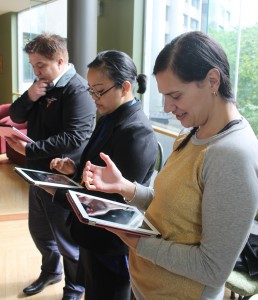
Gareth Seymour (nō Te Taura Whiri i te Reo Māori) rātou ko Migoto Eria (nō Te Whare Taoka o Ōtākou) ko Dr Karyn Paringatai (nō Te Tumu) e purei ana i te kēmu.
Recent Te Tumu theses
Te Tumu had a number of its students honoured at the university’s recent Graduation, including several doing post-graduate research.
Samantha Jackson, “Ko Te Houhanga a Rongo marae tōku tūrangawaewae: In search of a philosophical standing place for indigenous development”, (MA Indigenous Development).
Supervisors: Professor Grant Gillett, Associate Professor Merata Kawharu, Dr. Paerau Warbrick
Abstract: Dominant paradigms of development assume a linear progression from one established point to another. These paradigms do not take into account the complexity of indigenous voice, spirit and ways of being-in-the-world, leaving indigenous peoples without a meaningful place to stand. To approach the question of indigenous development in such a straight forward manner is a methodological error which stands to obscure meaningful indigenous development and silence the indigenous spirit.
In order to appropriately investigate the question of indigenous development, I argue we must awaken ourselves to our assumptions which form the background of how we view and understand ourselves, the world and others. I draw on Martin Heidegger’s interrogation of Cartesian thought to provide a space through which indigenous development can be meaningfully approached from a tangata whenua (Māori, people of the land) philosophical perspective.
I utilise the traditions and teachings of Reverend Māori Marsden to posit a meaningful model of indigenous development must be rooted in Te Ao Mārama traditions (Māori worldview), a woven universe of connection between self, ancestors, universe and gods. This idea is mooted in an international indigenous context, before returning to the traditions pertaining to Te Houhanga a Rongo marae (Māori cultural complex), my own tūrangawaewae (place to stand). I argue marae are a manifestation of Te Ao Mārama worldview and therefore an appropriate site to investigate indigenous development. I utilise whakapapa (genealogy) and kōrero pūrākau (stories of origin) as important mechanisms through which one can come to understand and organise the relationship between a person, their world and their gods. Maintaining an intimate relationship within the woven universe validates a person’s tūrangawaewae giving them the ‘sureness of touch’ of a person firmly rooted in belonging with unlimited potential for human development.
Nicole McCrossin, “Intention and Implementation: Piecing Together Provisions for Māori in the Resource Management Act 1991″, (MA, Indigenous Development)
Supervisors: Dr Janet Stephenson and Dr Jenny Bryant-Tokalau
Abstract: Today, it is widely recognised that indigenous people have a valuable contribution to make to the development and practice of resource management. New Zealand legislation recognises in part the importance of Māori participation; however, there appears to be a considerable gap between the recognition of these rights and their effective and widespread implementation at ground level. This study explores the intentions behind, and the implementation of Section 33 transfers of power and Sections 36B-E joint management agreements, under the Resource Management Act 1991, which support Māori participation in resource management decision-making. These provide for the devolution of power from local authorities to iwi authorities and the establishment of agreements to co-manage resources with iwi. A nationwide survey of local authorities’ use of the provisions demonstrated that they had been virtually unused. The majority of local authorities do not have any form of co-management agreements with Māori, and those that do have quite constrained arrangements which are designed to enhance consultation, rather than shared decision-making. The results of the survey are contrasted to findings from a series of semi-structured interviews with key informants involved in the crafting of the RMA, which examines the intentions behind the inclusion of these mechanisms in the legislation. The concept of institutional bricolage is used to help explain their creation and implementation, and the subsequent negotiation of the mechanisms and their alternatives by councils. The survey and interview results revealed that an intentional institutional bricolage approach was frequently employed by councils and iwi to negotiate co-management arrangements, but was not used in the crafting of the RMA co-management provisions. Instead, the provisions were a result of unintentional institutional bricolage, drawing on a range of structural and social influences.
Congratulations to Assoc Prof Jenny Bryant-Tokalau
Great News: Te Tumu’s Assoc Prof Jenny Bryant-Tokalau has just been appointed as Adjunct Professor in the School of Government, Development and International Affairs, Faculty of Business and Economics, at the University of the South Pacific in Suva, Fiji. Even better news…This doesn’t mean that Te Tumu will be losing Jenny, who is the Coordinator of our Pacific Islands Studies programme, and Chair of our Postgraduate Committee. The USP position is an honorary one in recognition of her research on Fijian topics.
Click here for the Otago Bulletin story.

